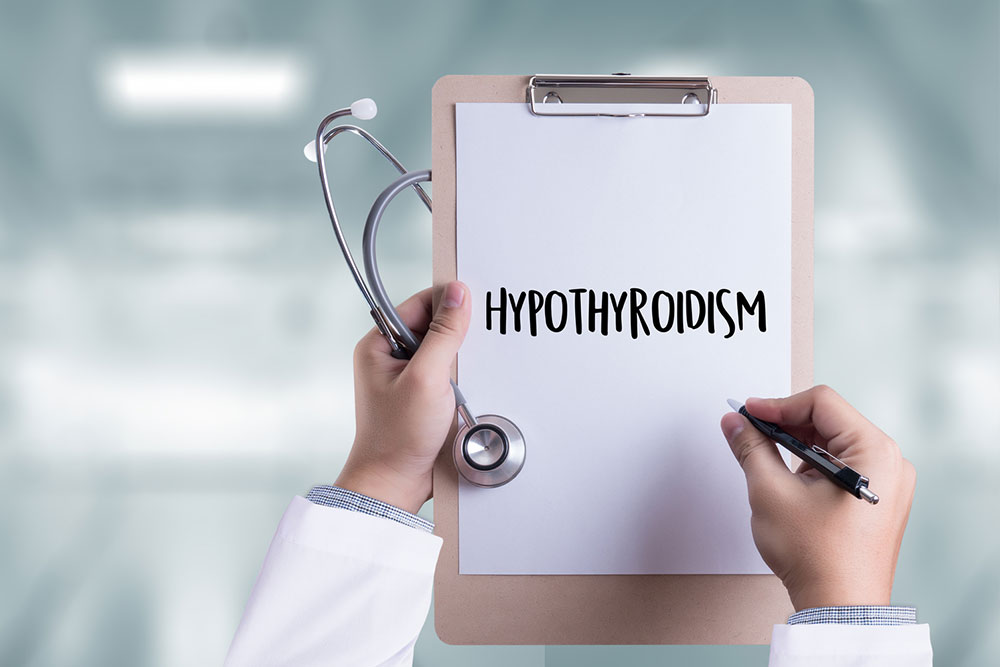Hyperthyroidism vs. Hypothyroidism – Symptoms and Causes
The thyroid is one of the most important glands in the body. It is shaped like a butterfly and is located in the front of the neck, just below the thyroid gland, around the windpipe. The isthmus—a bridge of tissues—joins the two thyroid lobes on each side. The thyroid gland helps regulate several metabolic processes throughout the body.
When there are certain discrepancies noted in the functioning of this gland, it could cause either hyperthyroidism or hypothyroidism and so on. Symptoms of thyroid problems are often very distinctly noticed in the human body. The different types of thyroid problems affect either the gland’s functioning or its structure as a whole.

Iodine is mainly used by the thyroid gland to produce these vital hormones. The functionality of the thyroid gland is controlled and regulated by a mechanism involving feedback received by the brain.
Hypothyroidism
This condition is categorized with the thyroid gland producing lesser quantities of its primary hormones. The pituitary gland produces more TSH in order to compensate for this. In the following, the symptoms and common causes of hypothyroidism have been listed and explained in brief. The symptoms of hypothyroidism include, but are not limited to, the following:
- Dry skin
- Constipation
- Weakness
- Fatigue
- Difficulty in concentrating
Some of the conditions that can cause hypothyroidism are as follows:
Hashimoto’s disease – This condition is caused when the body starts fighting against its own thyroid cells. It is an autoimmune condition which leads to the thyroid gland not being able to produce enough hormones. It may take several years for the symptoms of this disease to appear and for any significant damage to take place.
Iodine deficiency – Iodine is necessary for the thyroid gland to produce the vital hormones it does. An iodine deficiency presents its own set of difficulties and can lead to the development of hypothyroidism as well.
Thyroiditis – This condition leads to the inflammation of the thyroid gland. It is caused by either a viral infection as a result of an autoimmune disease. It hampers the abilities of the thyroid gland and prevents it from producing enough quantities of the hormones it does. This leads to hypothyroidism.
Hyperthyroidism
Hyperthyroidism is a condition categorized by several symptoms as well. It is caused by the thyroid producing a high quantity of hormones. This leads to an increase in the metabolism rate. The pituitary gland produces less TSH in order to compensate for this. In the following, some of the symptoms and causes of hyperthyroidism have been listed. Read on to know more about this type of thyroid disorder.
The symptoms of hyperthyroidism include, but are not limited to, the following:
- An increase in appetite
- Tremors
- Nervousness
- A high heart rate
- Difficulty in sleeping
- Anxiety issues
The following are some of the conditions that could lead to the development of hyperthyroidism.
Thyroiditis – Thyroiditis eventually leads to hypothyroidism but may cause hyperthyroidism in the short term. This happens due to the inflammation of the thyroid gland. It causes excess hormones to be produced which are then released altogether.
Increased iodine quantities – Having too little iodine is as much a problem as is having too much iodine in the body. Too much iodine in the system can lead to hyperthyroidism. This may happen due to the intake of certain medications over a long period of time that are rich in iodine—such as certain cough syrups.
Graves’ disease – This condition is one of the most common reasons for the onset of hyperthyroidism and is characterized by the inflammation of the thyroid gland. This condition shares many similarities to hyperthyroidism and can eventually lead to development of the condition.
Thyroid cancer is another problem affecting many people in the country. It is most common among adult women. According to statistics, two-thirds of all cases have been reported among people aged below 55. There are different types and stages of thyroid cancer. This depends on which cell type within the thyroid gland was found to be malignant. The most important thing is to get the thyroid problems diagnosed in its early stages. The symptoms of thyroid problems are best able to be managed when diagnosed early. It increases the survival rate and allows for a good prognosis.
